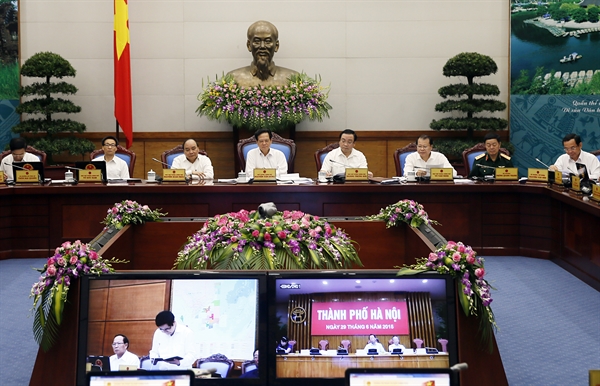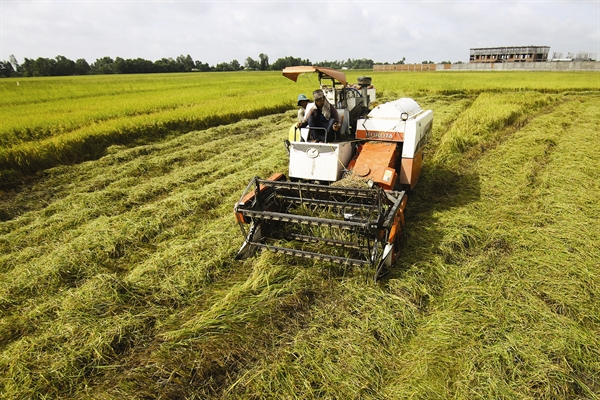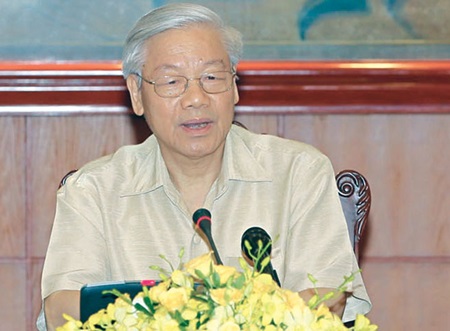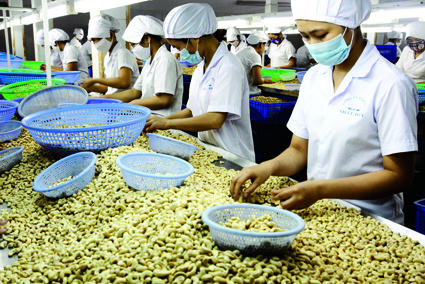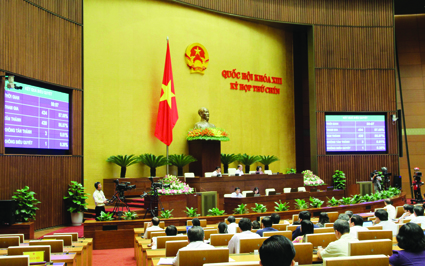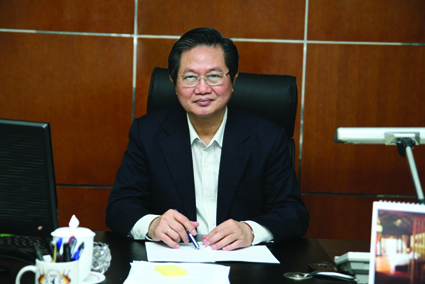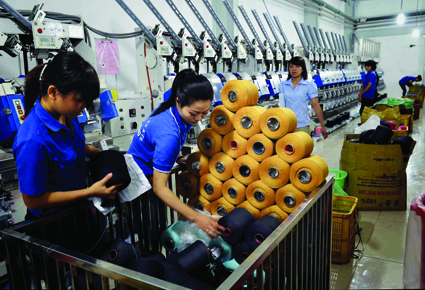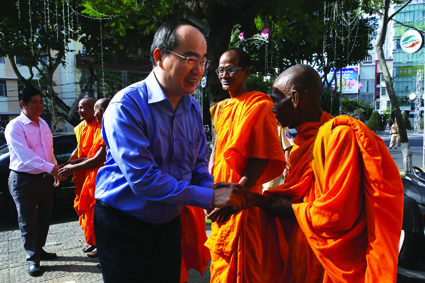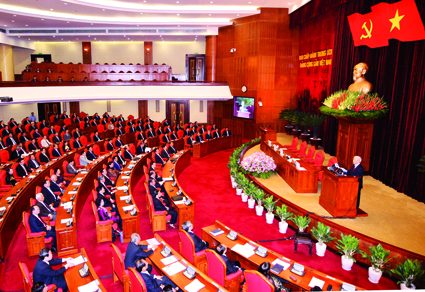Vietnam and the United States (US) adopted on July 7 (local time) a joint vision statement between the two countries on the occasion of an official visit to the US by General Secretary of the Communist Party of Vietnam Nguyen Phu Trong from July 6-10 at the invitation of the US Administration.
In the statement, Vietnam and the US recognize the positive and substantive developments in many areas of cooperation over the past 20 years since the establishment of diplomatic relations, particularly the growth in economic and trade cooperation, cooperation in addressing war legacy issues as well as in science and technology, education, health care, environment, response to climate change, defense, security, human rights, and increasing regional and international cooperation on issues of mutual concern.
 |
| Party General Secretary Nguyen Phu Trong has a talk with US President Barack Obama in the White House on July 7 __Photo: Tri Dung/VNA |
The statement says the two countries have made numerous significant accomplishments since the formation of the US-Vietnam Comprehensive Partnership in 2013. In particular, there has been continued rapid growth in bilateral trade and investment; the entry into force of the “123” Agreement for Cooperation Concerning Peaceful Uses of Nuclear Energy; Vietnam’s endorsement of the Proliferation Security Initiative’s Statement of Interdiction Principles; the easing of US restriction of arms sales; the signing of the Joint Vision Statement on Defense Relations; and increased cooperation on regional and multilateral issues. The first-ever dialogues and exchanges between entities associated with the Communist Party of Vietnam on the one hand and institutes associated with the Republican and Democratic Parties in the US on the other also took place, as envisaged by the 2013 Comprehensive Partnership.
Vision for US-Vietnam relations: deepening a long-term partnership
Both countries affirm their continued pursuit of a deepened, sustained, and substantive relationship on the basis of respect for the United Nations Charter, international law, and each other’s political systems, independence, sovereignty and territorial integrity. The two sides are committed to maximizing shared interests and cooperation at both bilateral and multilateral levels, for the benefit of both peoples, contributing to peace, stability, cooperation and prosperity in the Asia-Pacific region and the world.
Strengthening political and diplomatic relations, increasing exchanges at high levels, and expanding bilateral consultations to continue to build trust and improve cooperation remain priorities for both the US and Vietnam, as are enhancing economic, trade, and investment cooperation and deepening cooperation in science and technology, education, training, health, environment, and law enforcement, the statement says, adding the two countries recognize the success of the Vietnamese community in the US and their great contributions both to the development of the US and Vietnam and to better the US-Vietnam bilateral relations.
The two sides reaffirm continued bilateral cooperation in defense and security, as outlined in the US-Vietnam Joint Vision Statement on Defense Relations. Both countries underscore their commitment to collaborating on, among other issues, addressing non-traditional security threats, cooperation in maritime security, maritime domain awareness, defense trade and information sharing, search and rescue, humanitarian assistance and disaster relief, and defense technology exchange. Both countries welcome joint efforts to address war legacy issues, including the humanitarian mission of missing in action (MIA) recovery, the clearance of unexploded ordinance and dioxin remediation, and further assistance for these humanitarian efforts.
The two countries expect to work in close coordination with the other negotiating parties to conclude the ambitious and comprehensive Trans-Pacific Partnership (TPP) agreement as soon as possible and to carry out whatever reforms may be necessary to meet the high standards of such agreement, including as necessary with respect to commitments relating to the 1998 International Labor Organization’s Declaration of Fundamental Principles and Rights at Work. Both countries are committed to a high-quality, balanced TPP agreement that meets the interests of all parties and creates a new long-lasting, mutually beneficial framework for economic and trade cooperation between the US and Vietnam, while providing a new impetus for regional economic cooperation and contributing to cooperation and prosperity in the Asia-Pacific region. The US applauds Vietnam’s progress in economic reforms and affirms continued support for and constructive engagement with Vietnam, and notes Vietnam’s interest in pursuing market economy country status.
Both countries pledge continued support for the promotion and protection of human rights and support the maintenance of positive, frank, and constructive dialogue on human rights to improve mutual understanding, and reduce differences. They encourage further cooperation to ensure that everyone, including members of vulnerable groups, regardless of their gender, race, religion, or sexual orientation, and including persons with disabilities, enjoy fully their human rights. The US welcomes Vietnam’s ongoing efforts to harmonize its laws with its 2013 Constitution and international commitments, which Vietnam undertakes for its comprehensive development, including the promotion and protection of human rights and fundamental freedoms. The US also welcomes Vietnam’s ratification of the Convention against Torture and other Cruel, Inhuman, or Degrading Treatment or Punishment and the Convention on the Rights of Persons with Disabilities, and the two countries look forward to technical cooperation in this regard.
The US and Vietnam expect to accelerate education cooperation, including through institutions like Fulbright University Vietnam and other university partnerships and in the areas of English language collaboration. The promotion of people-to-people exchanges remains important. Both countries expect to consider visa facilitation measures to encourage greater numbers of tourists, students, and business visitors to both countries, and call for relevant US and Vietnamese agencies to conclude as soon as possible a bilateral agreement on the construction of new compounds of their representative missions, including their embassies.
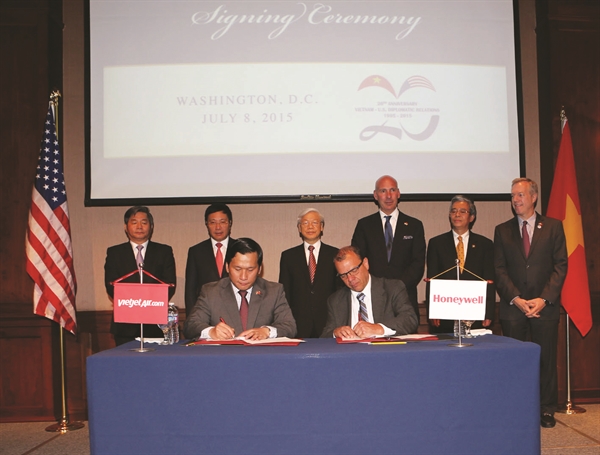 |
| Party General Secretary Nguyen Phu Trong witnesses the signing of an MoU on the selection and installation of supplementary engine and aircraft electronic equipment for VietJet Air’s new aircraft fleet between VietJet Air and the US’s Honeywell Aerospace in Washington D.C. __Photo: Tri Dung/VNA |
Increasing cooperation on global and regional issues
The statement says the US welcomes Vietnam’s active international integration policy, and Vietnam welcomes the US’ policy of enhanced cooperation with the Asia-Pacific region. Each country commends the other’s contributions to supporting peace, security, stability and prosperity in the region and the world over. The US and Vietnam are also committed to strengthening cooperation on regional and global issues of mutual interest and concern.
The two countries are committed to promoting cooperation on sustainable development, addressing traditional and non-traditional security threats, including natural disasters, wildlife trafficking, water security, and pandemics. They are committed to expanding collaboration on peacekeeping operations and climate change and look forward to the 2016 Nuclear Security Summit and to concrete national actions to promote nuclear security. Both sides pledge to expand cooperation on the Global Health Security Agenda (GHSA), including toward achieving the GHSA targets as soon as possible.
The US and Vietnam are committed to enhancing cooperation in regional fora, such as the Asia-Pacific Economic Cooperation forum, the Association of Southeast Asian Nations (ASEAN) Regional Forum, the Lower Mekong Initiative, and the East Asia Summit, and recognize the importance of a united and strong ASEAN, ASEAN’s central role in the regional political and security architecture, and the United States-ASEAN Strategic Partnership.
Both countries are concerned about recent developments in the South China Sea that have increased tensions, eroded trust, and threatened to undermine peace, security, and stability. They recognize the imperative of upholding the internationally recognized freedoms of navigation and overflight; unimpeded lawful commerce, maritime security and safety; refraining from actions that raise tensions; ensuring that all actions and activities taken comply with international law; and rejecting coercion, intimidation, and the use or threat of force. Both countries support the peaceful resolution of disputes in conformity with international law, including the 1982 United Nations Convention on the Law of the Sea (UNCLOS), and recognize the importance of fully implementing the Declaration on the Conduct of Parties in the East Sea in its entirety, as well as efforts to conclude the Code of Conduct of Parties in the East Sea.
Talking with the local press after the Party leader’s visit, Party Central Committee member and Head of the Party Central Committee’s Commission for External Relations Hoang Binh Quan called the visit historical, explaining this is the first time a Party General Secretary of Vietnam, a position without any counterpart in the US administrative system, has received an invitation from the US Administration to visit the US, a former enemy with a different political regime. President Obama and leaders of the US Administration and Congress welcomed the Vietnamese Party leader with due respect and a full and substantive working agenda.
The visit took place on the occasion of the 20th anniversary of normalization of relations between the two countries, therefore, it provided a chance for both sides to review their ties over the past two decades and define a vision and orientations for the development of their relations in the time ahead, Quan said.
At the same time, the visit went down in history with a historic talk, where the top leaders of two countries that used to be enemies and have different political regimes, met, exchanged opinions and co-chaired a press conference right at the Oval Office in the White House, Quan noted.
He said the visit demonstrated a fact that two countries with different political regimes can still surmount their differences to understand and accept each other, and cooperate with each other for common interest.
Quan said the visit, with a busy schedule of 23 activities, produced practical and comprehensive outcomes.
Politically, the visit helps enhance the political trust and hence the relations between the two countries. The two sides had open and candid exchanges on issues that require efforts of both sides such as the TPP agreement and outstanding matters like human rights and addressing war consequences. An important highlight of the visit was to build mutual trust, understanding and respect.
Furthermore, the two sides evaluated the relations between Vietnam and the US after 20 years of establishing bilateral diplomatic ties and envisaged the bilateral rapports.
They talked on how to bolster cooperation in trade-investment, enhance ties in the realms of politics, diplomacy and national defense-security, and boost joint efforts in science-technology, education-training, health and climate change, with the aim of deepening the Vietnam-US comprehensive partnership and creating the foundation for lifting bilateral ties to another height.
The visit saw the signing of 14 cooperation documents, including important deals in the fields of aviation, taxation, banking, oil and gas.
The Party leader’s visit has confirmed Vietnam’s consistent policy of independence, self-reliance, peace, cooperation and development, active international integration and being a responsible member of the international community, Quan noted.
Mentioning the Party chief’s important speech when he met with US scholars at the Center for Strategic and International Studies (CSIS), the leading US agency for academic research and exchange, Quan said the speech reflected an overall vision of the relations between the two countries, directly mentioning sensitive issues and strategic analysis on developments in the region and the world.
The speech focused on analyzing historic events in the Vietnam-US ties, which were not announced widely, and gave an objective view on the US war in Vietnam and on the spirit of “leaving the past behind, rising over differences, maximizing similarities, and heading toward a brighter future,” Quan said.
The speech also candidly discussed the human rights issues and highlighted Vietnam’s policy on cooperation on regional and international issues, including the maintenance of peace, security, aviation and navigation freedom in the Asia-Pacific and the East Sea.
Especially, in his speech, the Party chief delivered an optimistic message about the Vietnam-US relationship by taking former US President Theodore Roosevelt quote “Believe you can and you are halfway there.”
Quan said the visit would be a historic milestone, opening a new chapter in the two countries’ relations.
Potential is blossoming for the two sides to step up their all-around cooperation in the future, Quan said, adding that if the TPP agreement is signed, it will provide more mutually beneficial opportunities for the two nations to expand their ties.
He also underlined the need for both countries to intensify efforts to make Vietnam-US relations stronger and more effective on the principle of “respecting each other’s independence, sovereignty, territorial integrity and political regime and mutually benefiting cooperation” while following the motto of “candid and constructive dialogue” in dealing with issues of differences.- VNA/VLLF
